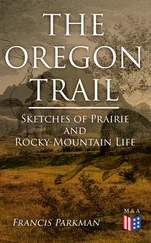Francis Parkman - Tte Oegon Trail
Здесь есть возможность читать онлайн «Francis Parkman - Tte Oegon Trail» весь текст электронной книги совершенно бесплатно (целиком полную версию без сокращений). В некоторых случаях можно слушать аудио, скачать через торрент в формате fb2 и присутствует краткое содержание. Жанр: Приключения про индейцев, Историческая проза, Прочая документальная литература, на английском языке. Описание произведения, (предисловие) а так же отзывы посетителей доступны на портале библиотеки ЛибКат.
- Название:Tte Oegon Trail
- Автор:
- Жанр:
- Год:неизвестен
- ISBN:нет данных
- Рейтинг книги:5 / 5. Голосов: 1
-
Избранное:Добавить в избранное
- Отзывы:
-
Ваша оценка:
- 100
- 1
- 2
- 3
- 4
- 5
Tte Oegon Trail: краткое содержание, описание и аннотация
Предлагаем к чтению аннотацию, описание, краткое содержание или предисловие (зависит от того, что написал сам автор книги «Tte Oegon Trail»). Если вы не нашли необходимую информацию о книге — напишите в комментариях, мы постараемся отыскать её.
Tte Oegon Trail — читать онлайн бесплатно полную книгу (весь текст) целиком
Ниже представлен текст книги, разбитый по страницам. Система сохранения места последней прочитанной страницы, позволяет с удобством читать онлайн бесплатно книгу «Tte Oegon Trail», без необходимости каждый раз заново искать на чём Вы остановились. Поставьте закладку, и сможете в любой момент перейти на страницу, на которой закончили чтение.
Интервал:
Закладка:
When this ragamuffin horde had passed, we caught our horses, saddled, harnessed, and resumed our journey. Fording the creek, the low roofs of a number of rude buildings appeared, rising from a cluster of groves and woods on the left; and riding up through a long lane, amid a profusion of wild roses and early spring flowers, we found the log- church and school-houses belonging to the Methodist Shawanoe Mission. The Indians were on the point of gathering to a religious meeting. Some scores of them, tall men in half-civilized dress, were seated on wooden benches under the trees; while their horses were tied to the sheds and fences. Their chief, Parks, a remarkably large and athletic man, was just arrived from Westport, where he owns a trading establishment. Beside this, he has a fine farm and a considerable number of slaves. Indeed the Shawanoes have made greater progress in agriculture than any other tribe on the Missouri frontier; and both in appearance and in character form a marked contrast to our late acquaintance, the Kansas.
A few hours' ride brought us to the banks of the river Kansas. Traversing the woods that lined it, and plowing through the deep sand, we encamped not far from the bank, at the Lower Delaware crossing. Our tent was erected for the first time on a meadow close to the woods, and the camp preparations being complete we began to think of supper. An old Delaware woman, of some three hundred pounds' weight, sat in the porch of a little log-house close to the water, and a very pretty half-breed girl was engaged, under her superintendence, in feeding a large flock of turkeys that were fluttering and gobbling about the door. But no offers of money, or even of tobacco, could induce her to part with one of her favorites; so I took my rifle, to see if the woods or the river could furnish us anything. A multitude of quails were plaintively whistling in the woods and meadows; but nothing appropriate to the rifle was to be seen, except three buzzards, seated on the spectral limbs of an old dead sycamore, that thrust itself out over the river from the dense sunny wall of fresh foliage. Their ugly heads were drawn down between their shoulders, and they seemed to luxuriate in the soft sunshine that was pouring from the west. As they offered no epicurean temptations, I refrained from disturbing their enjoyment; but contented myself with admiring the calm beauty of the sunset, for the river, eddying swiftly in deep purple shadows between the impending woods, formed a wild but tranquillizing scene.
When I returned to the camp I found Shaw and an old Indian seated on the ground in close conference, passing the pipe between them. The old man was explaining that he loved the whites, and had an especial partiality for tobacco. Delorier was arranging upon the ground our service of tin cups and plates; and as other viands were not to be had, he set before us a repast of biscuit and bacon, and a large pot of coffee. Unsheathing our knives, we attacked it, disposed of the greater part, and tossed the residue to the Indian. Meanwhile our horses, now hobbled for the first time, stood among the trees, with their fore-legs tied together, in great disgust and astonishment. They seemed by no means to relish this foretaste of what was before them. Mine, in particular, had conceived a moral aversion to the prairie life. One of them, christened Hendrick, an animal whose strength and hardihood were his only merits, and who yielded to nothing but the cogent arguments of the whip, looked toward us with an indignant countenance, as if he meditated avenging his wrongs with a kick. The other, Pontiac, a good horse, though of plebeian lineage, stood with his head drooping and his mane hanging about his eyes, with the grieved and sulky air of a lubberly boy sent off to school. Poor Pontiac! his forebodings were but too just; for when I last heard from him, he was under the lash of an Ogallalla brave, on a war party against the Crows.
As it grew dark, and the voices of the whip-poor-wills succeeded the whistle of the quails, we removed our saddles to the tent, to serve as pillows, spread our blankets upon the ground, and prepared to bivouac for the first time that season. Each man selected the place in the tent which he was to occupy for the journey. To Delorier, however, was assigned the cart, into which he could creep in wet weather, and find a much better shelter than his bourgeois enjoyed in the tent.
The river Kansas at this point forms the boundary line between the country of the Shawanoes and that of the Delawares. We crossed it on the following day, rafting over our horses and equipage with much difficulty, and unloading our cart in order to make our way up the steep ascent on the farther bank. It was a Sunday moming; warm, tranquil and bright; and a perfect stillness reigned over the rough inclosures and neglected fields of the Delawares, except the ceaseless hum and chirruping of myriads of insects. Now and then, an Indian rode past on his way to the meeting-house, or through the dilapidated entrance of some shattered log-house an old woman might be discerned, enjoying all the luxury of idleness. There was no village bell, for the Delawares have none; and yet upon that forlorn and rude settlement was the same spirit of Sabbath repose and tranquillity as in some little New England village among the mountains of New Hampshire or the Vermont woods.
Having at present no leisure for such reflections, we pursued our journey. A military road led from this point to Fort Leavenworth, and for many miles the farms and cabins of the Delawares were scattered at short intervals on either hand. The little rude structures of logs, erected usually on the borders of a tract of woods, made a picturesque feature in the landscape. But the scenery needed no foreign aid. Nature had done enough for it; and the alteration of rich green prairies and groves that stood in clusters or lined the banks of the numerous little streams, had all the softened and polished beauty of a region that has been for centuries under the hand of man. At that early season, too, it was in the height of its freshness and luxuriance. The woods were flushed with the red buds of the maple; there were frequent flowering shrubs unknown in the east; and the green swells of the prairies were thickly studded with blossoms.
Encamping near a spring by the side of a hill, we resumed our journey in the morning, and early in the afternoon had arrived within a few miles of Fort Leavenworth. The road crossed a stream densely bordered with trees, and running in the bottom of a deep woody hollow. We were about to descend into it, when a wild and confused procession appeared, passing through the water below, and coming up the steep ascent toward us. We stopped to let them pass. They were Delawares, just returned from a hunting expedition. All, both men and women, were mounted on horseback, and drove along with them a considerable number of pack mules, laden with the furs they had taken, together with the buffalo robes, kettles, and other articles of their traveling equipment, which as well as their clothing and their weapons, had a worn and dingy aspect, as if they had seen hard service of late. At the rear of the party was an old man, who, as he came up, stopped his horse to speak to us. He rode a little tough shaggy pony, with mane and tail well knotted with burrs, and a rusty Spanish bit in its mouth, to which, by way of reins, was attached a string of raw hide. His saddle, robbed probably from a Mexican, had no covering, being merely a tree of the Spanish form, with a piece of grizzly bear's skin laid over it, a pair of rude wooden stirrups attached, and in the absence of girth, a thong of hide passing around the horse's belly. The rider's dark features and keen snaky eyes were unequivocally Indian. He wore a buckskin frock, which, like his fringed leggings, was well polished and blackened by grease and long service; and an old handkerchief was tied around his head. Resting on the saddle before him lay his rifle; a weapon in the use of which the Delawares are skillful; though from its weight, the distant prairie Indians are too lazy to carry it.
Читать дальшеИнтервал:
Закладка:
Похожие книги на «Tte Oegon Trail»
Представляем Вашему вниманию похожие книги на «Tte Oegon Trail» списком для выбора. Мы отобрали схожую по названию и смыслу литературу в надежде предоставить читателям больше вариантов отыскать новые, интересные, ещё непрочитанные произведения.
Обсуждение, отзывы о книге «Tte Oegon Trail» и просто собственные мнения читателей. Оставьте ваши комментарии, напишите, что Вы думаете о произведении, его смысле или главных героях. Укажите что конкретно понравилось, а что нет, и почему Вы так считаете.












